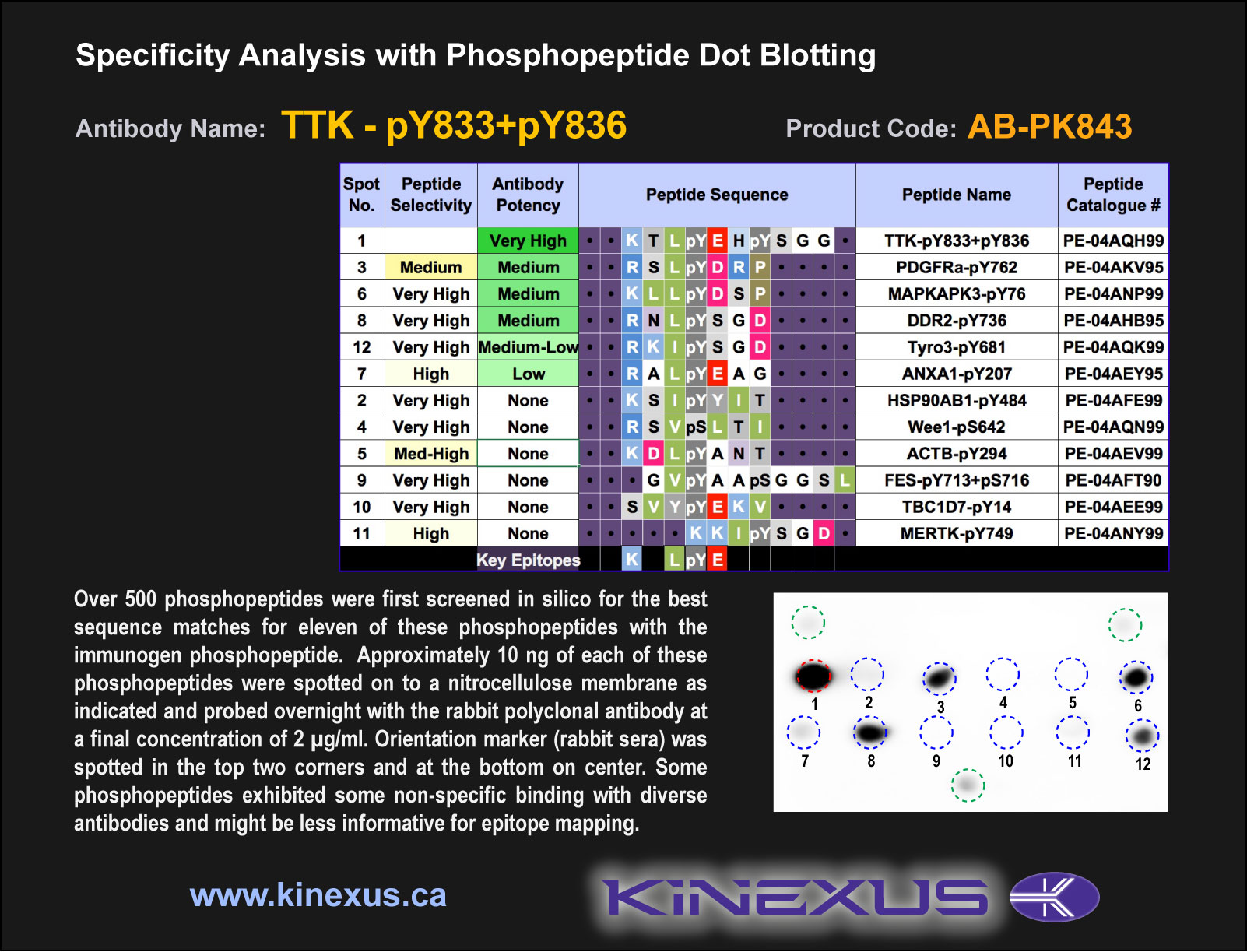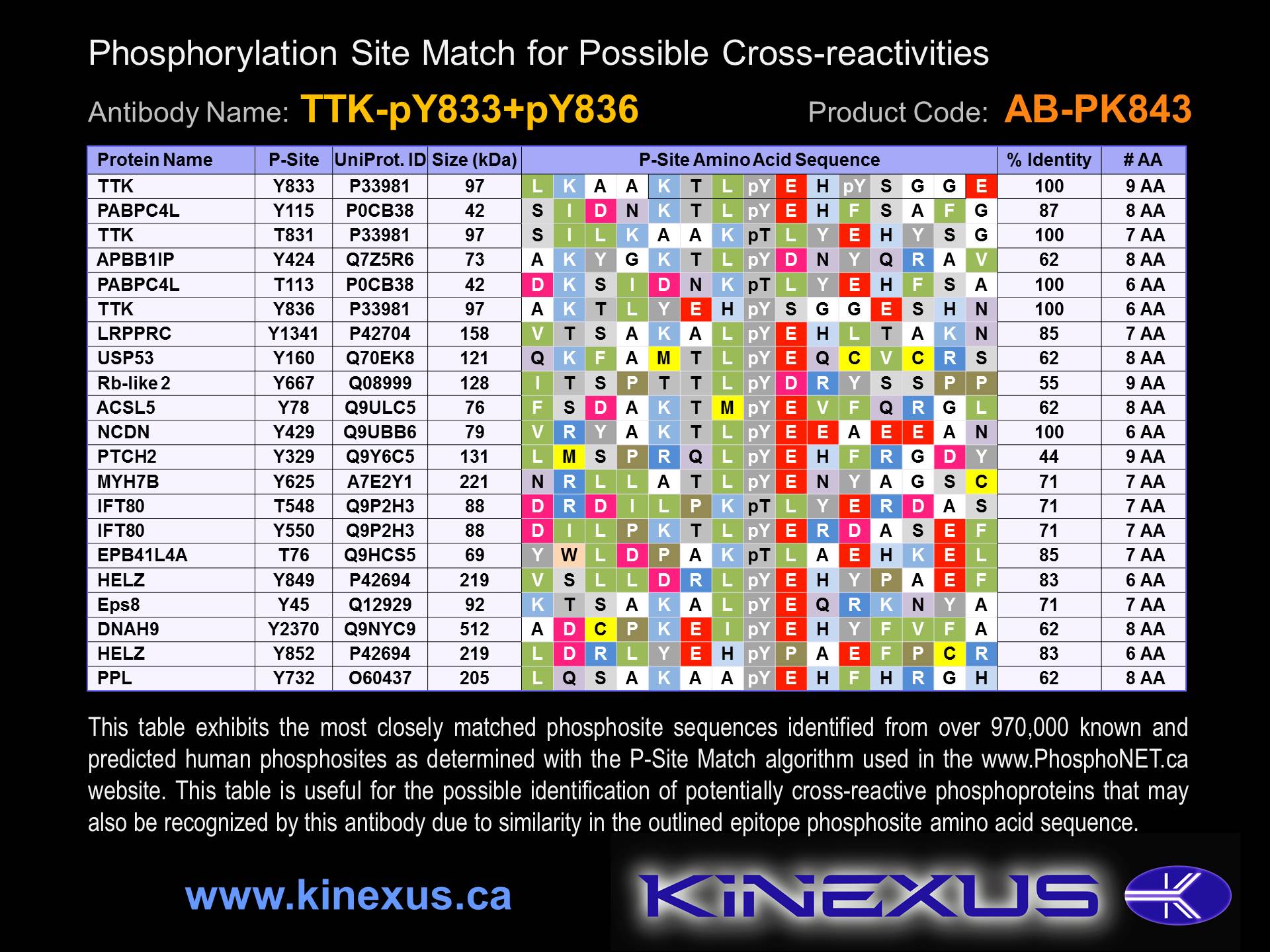Product Name: TTK-pY833+pY836
Product Number: AB-PK843
| Size: | 25 µg | Price: | 89.00 | |
| $US |
Target Full Name: Dual specificity protein kinase TTK
Target Alias: Cancer/testis antigen 96; CT96; ESK; Esk1; FLJ38280; Mps1; MPS1L1; Phosphotyrosine picked threonine-protein kinase; PYT; TTK protein kinase; ENSG00000112742
Product Type Specific: Protein kinase phosphosite-specific antibody
Antibody Code: PK843
Antibody Target Type: Phosphosite-specific
Antibody Phosphosite: Y833+Y836
Protein UniProt: P33981
Protein SigNET: P33981
Antibody Type: Polyclonal
Antibody Host Species: Rabbit
Target Alias: Cancer/testis antigen 96; CT96; ESK; Esk1; FLJ38280; Mps1; MPS1L1; Phosphotyrosine picked threonine-protein kinase; PYT; TTK protein kinase; ENSG00000112742
Product Type Specific: Protein kinase phosphosite-specific antibody
Antibody Code: PK843
Antibody Target Type: Phosphosite-specific
Antibody Phosphosite: Y833+Y836
Protein UniProt: P33981
Protein SigNET: P33981
Antibody Type: Polyclonal
Antibody Host Species: Rabbit
Antibody Immunogen Source: Human TTK sequence peptide Cat. No.: PE-04AQH99
Antibody Immunogen Sequence: KTL(pY)EH(pY)SGG(bA)C
Antibody Immunogen Description: Corresponds to amino acid residues K830 to G839; In the C-terminal region after the kinase catalytic domain. These are This is the major in vivo phosphorylation sites in TTK.
Antibody Immunogen Sequence: KTL(pY)EH(pY)SGG(bA)C
Antibody Immunogen Description: Corresponds to amino acid residues K830 to G839; In the C-terminal region after the kinase catalytic domain. These are This is the major in vivo phosphorylation sites in TTK.
Production Method: The immunizing peptide was produced by solid phase synthesis on a multipep peptide synthesizer and purified by reverse-phase hplc chromatography. Purity was assessed by analytical hplc and the amino acid sequence confirmed by mass spectrometry analysis. This peptide was coupled to KLH prior to immunization into rabbits. New Zealand White rabbits were subcutaneously injected with KLH-coupled immunizing peptide every 4 weeks for 4 months. The sera from these animals was applied onto an agarose column to which the immunogen peptide was thio-linked. Antibody was eluted from the column with 0.1 M glycine, pH 2.5. Subsequently, the antibody solution was neutralized to pH 7.0 with saturated Tris.This antibody was also subject to negative purification over phosphotyrosine-agarose.
Antibody Modification: Unconjugated. Contact KInexus if you are interest in having the antibody biotinylated or coupled with fluorescent dyes.
Antibody Modification: Unconjugated. Contact KInexus if you are interest in having the antibody biotinylated or coupled with fluorescent dyes.
Antibody Concentration: 0.25 mg/ml
Storage Buffer: Phosphate buffered saline pH 7.4, 0.05% Thimerasol
Storage Conditions: For long term storage, keep frozen at -40°C or lower. Stock solution can be kept at +4°C for more than 3 months. Avoid repeated freeze-thaw cycles.
Product Use: Western blotting | Antibody microarray
Antibody Dilution Recommended: 2 µg/ml for immunoblotting
Antibody Species Reactivity: Human
Antibody Positive Control: The observed molecular mass of the processed target protein on SDS-PAGE gels is reported to be around 90-103 kDa.
Antibody Cross Reactivity: Extremely cross-reactive in MCF7 cells, but much cleaner in A431 and HeLa cells.
Storage Buffer: Phosphate buffered saline pH 7.4, 0.05% Thimerasol
Storage Conditions: For long term storage, keep frozen at -40°C or lower. Stock solution can be kept at +4°C for more than 3 months. Avoid repeated freeze-thaw cycles.
Product Use: Western blotting | Antibody microarray
Antibody Dilution Recommended: 2 µg/ml for immunoblotting
Antibody Species Reactivity: Human
Antibody Positive Control: The observed molecular mass of the processed target protein on SDS-PAGE gels is reported to be around 90-103 kDa.
Antibody Cross Reactivity: Extremely cross-reactive in MCF7 cells, but much cleaner in A431 and HeLa cells.
Related Product 1: TTK-pY833+pY836 blocking peptide
Related Product 2: TTK-pT676 phosphosite-specific antibody (Cat. No.: AB-PK842)
Related Product 3: TTKSubtide - TTK protein kinase substrate peptide
Related Product 2: TTK-pT676 phosphosite-specific antibody (Cat. No.: AB-PK842)
Related Product 3: TTKSubtide - TTK protein kinase substrate peptide
Scientific Background: TTK (ESK) is a protein-serine/threonine kinase of the Other group and TTK family. It is a dual specificity protein kinase that can phosphorylate serine, threonine, and tyrosine residues and has a role in cell cycle progression through regulating centrosome duplication during S-phase. This function was CDK2-mediated by direct activation of TTK.. Through CDCA8 phosphorylation TTK can modulate AurKB at the centromere to align the chromosomes. Phosphorylation of S582, T675, T676, T686, and S742 increases phosphotransferase activity. Phosphorylation of T806 inhibits phosphotransferase activity. TTK is a dual-specificity protein kinase with activity toward serine, threonine and tyrosine residues. TTK was found to have a role Overexpression or dysregulation of TTK activtiy may promote cancer through aberrant duplication of centrosomes and promotiong of aneuploidy. Mutations in TTK are highly correlated in the development of microsatellite-unstable colorectal cancers. TTK is linked to pancreatic ductal adenocarcinoma (PDAC), and important in the growth and proliferation of PDAC cancer cells. Triple Negative Breast Cancer (TNBC) is a highly aggressive form of cancer and TTK is consistently upregulated in TNBC tissues.
Figure 1. Epitope mapping of TTK-pY833+pY836 antibody with similar phosphopeptides on dot blots.
Figure 2. Identification of phosphosites related to TTK-pY833+pY836.
© Kinexus Bioinformatics Corporation 2017



